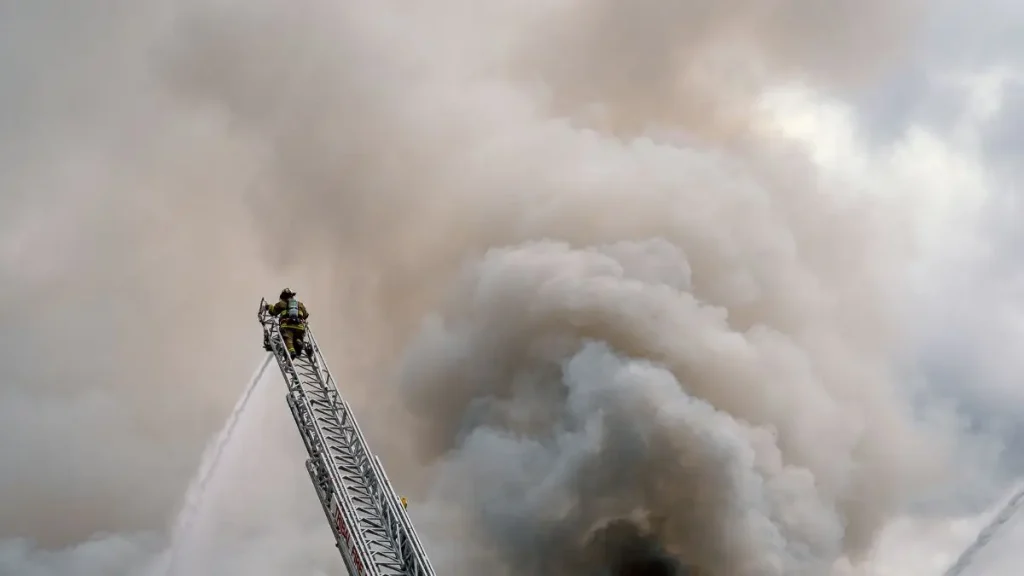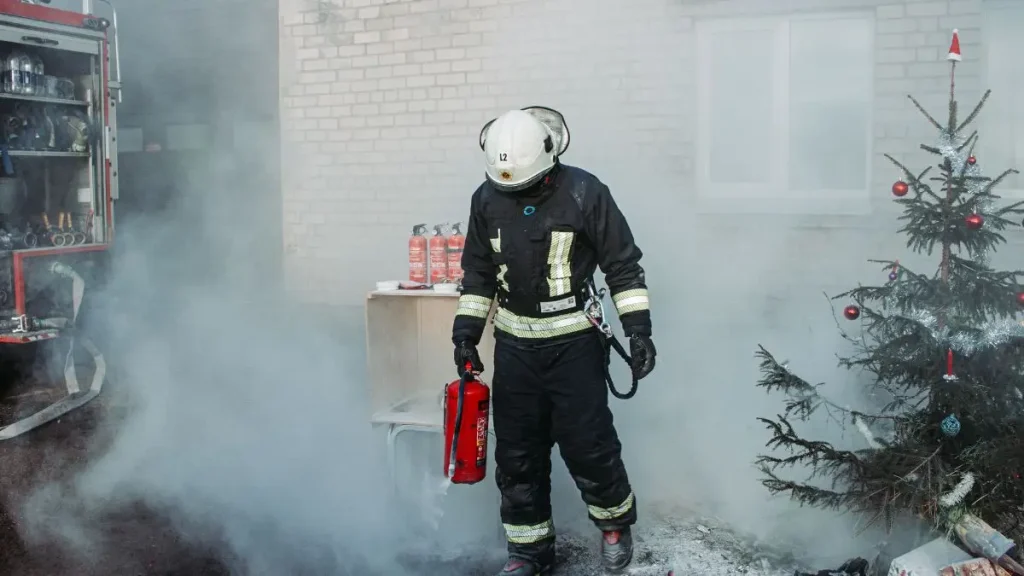Michigan Firefighters Respond to Large House Fire, No Injuries Confirmed
I want to start with the one thing that matters most here: everyone got out alive. When you hear about a Michigan home fire happening at 4:30 a.m., your mind immediately goes to the worst-case scenarios — people trapped inside, smoke spreading fast, and families waking up to chaos. Thankfully, at the home on Superior Street in Niles, the story ended differently.
The fire started in the garage and moved so quickly through the house that the family barely had time to react. Two adults and a child escaped just in time, while neighbors said they heard multiple explosions before fire crews arrived. The house itself took heavy damage — the kind you don’t come back to without months of rebuilding — but there were zero injuries, which is rare in a fire that violent and early in the morning.
I’m laying this out upfront because you and I both know that when a fire hits a home at 4 a.m., survival hinges on seconds, working alarms, and sometimes luck. And in this case, luck was on their side.
Now before I go deeper — what’s the first question that came to your mind when you heard “explosions” during a garage fire?
How the Fire Unfolded on Superior Street?

When I looked deeper into the reports — including the early update shared by WSBT — one detail stood out: the fire didn’t start inside the home. It began in the garage, sometime around 4:30 a.m., when most people are in their deepest sleep. That alone tells you how dangerous this situation could’ve been.
The fire moved quickly. Garage fires usually do. There’s fuel, tools, batteries, and all kinds of heat-sensitive stuff in there, so once the flames rise, they don’t wait for anyone. Neighbors said they woke up to a “boom” before they saw the glow outside. And honestly, if you’ve ever lived near a garage fire, you know that sound — it hits you like something just snapped in the quiet.
By the time crews reached 1609 Superior Street, the flames had already jumped from the garage into the house. It only takes a few minutes for fire to break through drywall and insulation. That morning, those few minutes made the difference between a close call and a tragedy.
The Explosions: What Could Have Caused Those Blasts?
The part everyone keeps talking about is the explosions. And I get it — when a neighbor says, “We heard multiple blasts,” you want to know what actually blew up.
Let me break it down in simple terms.
In garage fires, there are a handful of everyday items that behave unpredictably under heat:
- Propane tanks used for grills
- Gas cans people store for mowers
- Aerosol products like spray paint, lubricants, cleaners
- Vehicle fuel tanks
- Lithium-ion batteries from power tools or e-bikes
Any one of these can pop hard enough to shake windows. It doesn’t mean the fire itself was explosive — it means the stuff inside the garage reacted the way it always does under extreme heat.
And until investigators confirm the cause, the explosions are simply clues — loud ones — but clues nonetheless.
How the Family Managed to Escape in Time?
This is the part I keep coming back to: two adults and one child made it out without a scratch. At 4:30 in the morning. During a fire that traveled fast. That’s not something you overlook.
Most people underestimate how disorienting smoke is when you’re half asleep. It fills hallways faster than you think, and you can’t always see more than a few feet ahead. The fact that the family managed to get outside before the fire spread into living spaces is a sign that either:
- their alarms worked,
- someone woke up in time,
- or pure instinct kicked in.
If you’ve ever walked through your home in the dark, you know how many ways a situation like this could’ve gone wrong. That’s why every no-injury fire feels like a small miracle.
Incidents like this always remind me of another case where an Ohio man lost his life while trying to rescue his dogs during a home fire — it shows how quickly a situation can turn deadly when seconds matter.
Fire Crews and Their Response on Scene
When crews arrived, the building was already in a dangerous stage. Garage fires burn hotter and faster, and once they reach the house, firefighters are basically racing the clock to stop the whole structure from collapsing.
I want to give credit where it’s due — the way they contained the fire kept it from jumping to neighboring homes. That’s not easy in older Michigan neighborhoods where houses sit close together.
Firefighters had to deal with:
- Heavy flames from the garage area
- Potential risks from whatever caused the explosions
- Early-morning low visibility
- Structural instability from heat damage
Still, no residents or firefighters were injured. A lot of people don’t realize how significant that is — the majority of fire-related injuries actually happen during these intense containment moments.
I’ve seen this same pattern in other incidents too, like the South Charleston home that was completely engulfed before crews could even stabilize the scene, and the challenges firefighters faced there were almost identical.
What Investigators Are Looking At Now?

Right now, investigators don’t have a confirmed cause — and that’s normal. Garage fires take time to piece together because so many different materials can ignite first.
But here’s what they typically examine:
- Burn patterns that show where the fire started
- Electrical components in the garage
- Recently used tools or chargers
- Vehicles parked inside
- Fuel or chemical storage
- Anything related to the explosions neighbors heard
When a fire starts in a garage and spreads into the home, investigators have to rule out accidental ignition, electrical faults, human error, and mechanical issues one by one.
And until they finish, every detail — from the timing to the explosions — stays on the table.
A similar situation played out in Accomack County recently, where investigators dug through debris for days after a home was destroyed — the official investigation there also focused heavily on burn patterns and ignition sources.
Why Michigan Has Been Seeing More Home Fires Like This?
Let me add something most quick news reports skip: Michigan has seen a steady rise in home fire incidents over the past few years. You don’t notice the pattern until you start tracking the reports.
A few things contribute to this:
1. Garage Storage & Clutter
Michigan homes, especially older ones, often use garages for storing everything — gas cans, tools, batteries, chemicals. One bad spark can turn all of that into fuel.
2. Early-Morning Ignitions
A lot of fires around the state happen between 1 a.m. and 5 a.m. That’s the danger zone. People are asleep, alarms go unnoticed, and fires have time to grow.
3. Winter & Cold-Season Hazards
Even though this incident wasn’t winter-specific, Michigan’s climate plays a huge role in many fires:
- Overloaded heaters
- Extension cords running longer
- Vehicles warming up in garages
- Moisture causing electrical issues
4. Increased Use of Lithium Batteries
Power tools, e-bike chargers, and backyard equipment — all of these run on lithium batteries now. And when they fail, they fail violently.
And if you follow local safety updates or community alerts, you may have seen people sharing early details in multiple WhatsApp channels that track neighborhood incidents in real time — these channels often pick up things long before official statements come out.
What Every Homeowner Can Learn From This Fire?
I want to pause for a second here because fires like this aren’t just “local news.” They’re wake-up calls.
If you’re reading this, here’s the part that matters directly to you:
1. Clean and organize your garage
The more clutter, the more fuel. Fires feed on stuff, not space.
2. Don’t leave batteries charging overnight
Power tools, scooters, drills — unplug them before you sleep.
3. Keep gas and propane outside the home
Even a small leak can turn a minor fire into an explosive one.
4. Check smoke alarms every month
This fire happened at a time when alarms are your only lifeline.
5. Know two exit routes
When smoke hits, the main door isn’t always usable.
These aren’t dramatic suggestions — they’re the quiet habits that save families.
What Comes Next for the Family and the Investigation?
Right now, investigators will spend days — maybe weeks — figuring out how the fire started. Garage-origin fires always take longer because there are too many possible ignition points.
The family, meanwhile, is likely dealing with the immediate aftermath:
- Insurance claims
- Temporary housing
- Sorting through what’s left
- Meeting with adjusters
- Structural and safety inspections
A fire like this doesn’t end after the flames are out — it’s the beginning of a long recovery process.
But the biggest takeaway here is simple: They survived. That alone changes everything.
Let me ask you something before I wrap this section — If a fire started in your garage tonight, would you be confident you’d hear it in time?
If you follow incidents like these and want deeper breakdowns, you can always explore more fire safety stories and investigations on our website — they really help you understand how fast these situations turn serious.
Disclaimer: The information in this article is based on early reports, eyewitness accounts, and official statements available at the time of writing. Details may change as investigations continue. Readers are advised to follow updates from local authorities and verified news sources for the latest information.


